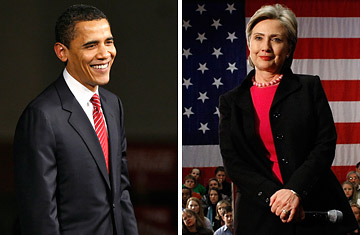
Democratic presidential candidates Barack Obama and Hillary Clinton.
Now that Barack Obama, Hillary Clinton and John Edwards have redirected their vote-getting and money-raising operations to the 22 states, 75 media markets and nearly 1,700 delegates up for grabs on February 5, otherwise known as Super Tuesday, one overriding reality guides their thinking — and it's buried way down in the weeds of the Democratic Party's road rules.
The rule is known as 13-B. And it states:
"States shall allocate district level delegates and alternates in proportion to their percentage of the primary or caucus vote won in that district, except that preferences falling below a 15 percent threshold shall not be awarded any delegates."
Translated into English, Rule 13-B means that any candidate who gets more than 15% of the vote in any primary will win convention delegates in direct proportion to his or her percentage of the popular vote.
Translated once more — and, this time, into harder-headed politics — it means that if they can stay in the race, both Obama and Clinton will continue to rack up convention delegates through the spring, regardless of who comes in first in each state. A second-place finish still gets you delegates. Which means that for either candidate to secure the 2,025 delegates needed to capture the nomination could take much longer than either campaign has bargained for.
Under Rule 13-B, it is possible that Clinton and Obama (and Edwards if he can stay competitive) simply carve Super Tuesday's nearly 1,700 delegates up three ways. With delegate-rich states such as California, New York, New Jersey and Illinois up for grabs, that is easy to imagine. Or Clinton and Obama could split the delegate haul in roughly equal fashion. If either of those things happen, the unprecedented national primary unfolding on February 5 won't determine much of anything at all. Except that the race will go on. And every delegate up for grabs after that becomes even more valuable to all sides.
Perhaps the most important thing about Rule 13-B is that it has never really been tested before. Party officials approved the rule only in 1988, after Jesse Jackson and Michael Dukakis fought a bruising five-month battle for the nomination. Dukakis led the entire time, but Jackson did well, winning nearly 1,000 delegates along the way. But in a few key states, Jackson was shut out of any delegates by rules that permitted allocation on a winner-take-all basis. In exchange for supporting Dukakis in the fall, Jackson wanted those old-fashioned primaries eliminated and replaced with proportional-allocation rules. Naturally, Dukakis agreed.
But in the primary campaigns since 1988, Democratic nominees have wrapped up their races with relative ease early on, meaning the proportional rule — and the full implications that come with a long, closely fought, three- or two-person race — have never been taken out for a drive. "We haven't seen anything like this," says Tad Devine, who hammered out 13-B in 1988 with his counterpart from the Jackson campaign (party rules maven Harold Ickes, who now works for Clinton). "We have always theorized about it, but it will be tested for the first time. Both candidates can keep collecting delegates for some time."
From here on out, Rule 13-B is what distinguishes the Democratic race from its Republican counterpart. The G.O.P. primaries are by and large winner-take-all affairs, expressly designed to winnow the field and produce a healthy front-runner and eliminate chaos. But in the Democratic contest, winnowing isn't part of the design; something closer to chaos is. Racking up delegates creates powerful leverage even for a second-place finisher. It gives an also-ran powerful cards to play at the convention for speaking rights, for rules changes — even a place on the ticket. Jackson, working without Rule 13-B 20 years ago, tried to leverage his delegates into all of those things.
And so while, yes, next week's 22-state contest could produce a clear front-runner and the momentum needed to lock up the nomination quickly, it is much more likely, thanks to Rule 13-B, that the fight will go on to all the other states. "If someone gets ahead, this whole thing takes care of itself," says a Clinton delegate hunter put it, "but if you have a lengthy and contested fight, securing the nomination becomes a real challenge."
Both camps realize that the way the delegates are allocated could mean that neither side captures a clear majority before April or even May. That is why both campaigns have sophisticated operations working behind the scenes trying to court and capture the nearly 800 super-delegates, convention officials (including all sorts of current and former elected officials) who get to vote on the nomination but are not pledged to any candidate. These boiler-room operations generate regular telephone calls from the candidates seeking support and pressure from donors to get behind one candidate or another, as well as discussion of possible jobs in a future Administration. The party created super-delegates after the 1980 election before Rule 13-B to prevent just the sort of confusion that could now unfold in the Democratic race.
Various estimates hold that Clinton is running ahead of Obama in the super-delegate sweepstakes, although they can technically change their allegiance even after they have pledged it. Devine, perhaps the party's leading expert on delegates, noted, "Super-delegates exist to prove some place for a nominating majority to coalesce outside the nominating process." But as this year has already shown, elections don't always work out the way party officials had planned.
